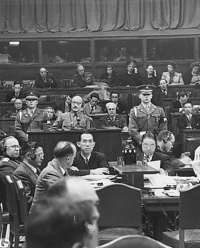A week of sighs. And gratitude. Spring finally arrived in the formerly frozen tundra in which your Bloguero has been confined since the Fall. There are now daffodils and tulips. The shagbark is in flower, and the leaves have finally started to unfold. Among the sounds your Bloguero hears is his own sigh of relief after a very long, very hard winter. The next sounds will probably include lawn mowers. And the hatching of the starling chicks in the nest these uninvited birds have built for the fourth year running in your Bloguero’s bathroom vent. For now, it is enough again to put duct tape on the switch for the fan, and sit idly in the sun and feel its warmth. Gracias, gracias, gracias, gracias for your Bloguero’s long journey from Winter to Spring.
Others have been far less fortunate. The Storms in Alabama and other parts of the South have killed hundreds and devastated communities. And in Ecuador Tungurahua has erupted. The radiation in Japan continues, though it has slipped off the front pages. It was a week in which Pachamama again undermined belief in the planet’s immutability and demonstrated her capacity for constant change, ever evolving impermanence. She is clearly unhappy. Humankind, however, apparently doesn’t pay attention. Or seek supplication. It is far happier with the facile, the grotesque spectacle of an imperial wedding and the Republican sociopathy when confronted with the President’s birth certificate. It’s no wonder that Pachamama is so unhappy.
Phoebe Snow passed on. For many, many years she devoted her life to caring for her child. She and her flutelike voice, sometimes almost a yodel, will be sorely missed. Thank goodness for Youtube.
A Dangerous Idea transformed your Bloguero’s expressed giddiness at the idea of his metaphorically becoming a human cannonball into dour sobriety. An English human cannonball was killed when his safety net “failed to engage.” A sad story.
A Victory Cigar announced your bloguero’s completion of the manuscript for his second novel, Tulum. What’s it all about?
The book, set in Tulum in Mexico’s Yucatan and in Cuba, is at once a travelogue, a love story, and the story of the unlikely friendship of a Mayan Curandero and a middle aged, gringo expat with a shady past, who ultimately embarks, as an apprentice, on the path of becoming a Shaman. There will be no spoiler here. The book, drawn from the deep cenote of Magical Realism, adopts Carlos Fuentes’s guidance:
A writer should never know the whole story. He imagines one part and asks the reader to finish it. A book should never close. The reader should continue it.
Put another way, your Bloguero’s not telling much. Not yet. He’s turning it over to you, the reader. He’s telling just enough to whet your materialist streak, the part of your internal dialogue that whispers, “You know, I really should buy a copy of that and read it. Did he say it was his second book? What was the first one like?”
And your Bloguero noted Shakespeare’s birthday with his favorite quote from the Tempest. You know the one. After all, your Bloguero believes, we are all such stuff as dreams are made on.
Your bloguero notes that this Digest is a weekly feature. Your Bloguero usually posts this Digest on Saturday morning early. He hopes that you will (again) forgive his putting it up a trifle early. Your bloguero will be back next week, hopefully on Saturday morning early.

 Severe storms have swept across the Midwest and Southern United States that have killed over 300 people as massive tornadoes swept through the region. It isn’t just tornadoes that are causing the devastation but the heavy rains have caused flooding that is wiping out entire towns as levees along the Mississippi and Missouri Rivers fail.
Severe storms have swept across the Midwest and Southern United States that have killed over 300 people as massive tornadoes swept through the region. It isn’t just tornadoes that are causing the devastation but the heavy rains have caused flooding that is wiping out entire towns as levees along the Mississippi and Missouri Rivers fail.
Recent Comments